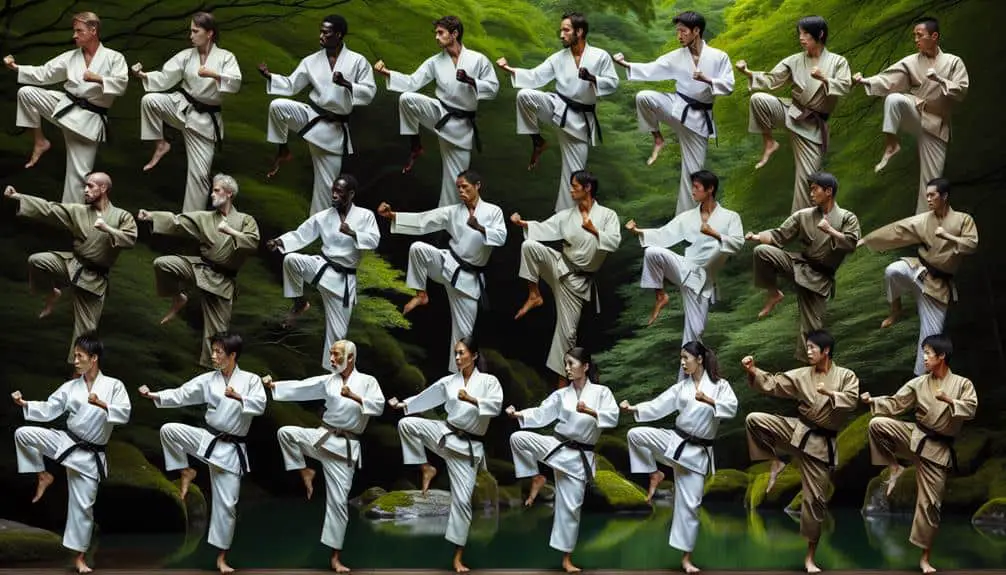To enhance teamwork, embrace the Flame Hashira's passion, Water Hashira's strategy. Practice clear communication, empathy, and active listening. Build trust with transparency, feedback, and fair task distribution. Resolve conflicts openly with clear guidelines. Coordinate through concise exchanges, feedback, and shared goals. Celebrate achievements as a team, boosting morale. Encourage peer support and accountability for ownership. Foster mutual respect through listening, feedback, and shared goals. Embrace team diversity for innovative problem-solving. Prioritize collaboration with clear communication and mutual accountability. Elevate your team's potential by mastering these Hashira training tips for teamwork.
Key Points
- Understand Hashira roles: Flame for inspiration, Water for strategy.
- Communication is key: eye contact, empathy, clarity.
- Build trust: active listening, transparency, resolve conflicts.
- Conflict resolution: open communication, team building, support.
- Enhance coordination: clear exchanges, specific feedback, shared goals.
Understanding Hashira Roles
Have you ever wondered what makes each Hashira role unique and essential in fostering teamwork within your team? Understanding roles within your team is vital for optimizing teamwork dynamics. Each Hashira brings a specialized skill set and perspective that contributes to the overall success of the team.
The Flame Hashira, for example, embodies passion and drive, igniting enthusiasm within the team and setting a high standard for performance. Their role is to inspire others and lead by example, creating a sense of urgency and determination that propels the team forward. Understanding and appreciating the Flame Hashira's role can boost morale and productivity, enhancing the team's overall performance.
On the other hand, the Water Hashira brings a calm and analytical approach to the team, balancing out the fiery energy of the Flame Hashira. Their ability to see the bigger picture and strategize effectively can help the team navigate challenges with clarity and precision. Recognizing the unique strengths of each Hashira role is essential for fostering a harmonious and effective team dynamic.
Communication Techniques
To enhance teamwork, focus on active listening and clear, concise communication. By honing these skills, you can foster better understanding and collaboration among team members.
Active Listening Skills
Developing active listening skills is crucial for effective communication and fostering strong teamwork within the Hashira Training program. Here are some key strategies to enhance your active listening abilities and promote better team building:
- Maintain Eye Contact: Show respect and attentiveness by looking directly at the speaker.
- Avoid Interrupting: Allow the speaker to express their thoughts fully before responding.
- Practice Empathy: Try to understand the speaker's perspective and emotions to build a deeper connection.
- Ask Clarifying Questions: Seek clarification to make certain you fully grasp the speaker's message and demonstrate your engagement.
Clear and Concise Communication
For effective teamwork and successful collaboration in the Hashira Training program, mastering clear and concise communication techniques is essential. Vital feedback plays a pivotal role in fostering understanding and alignment within a team. Providing specific and constructive feedback helps team members grow and improve their performance.
Encourage open dialogue by actively listening to others and expressing your thoughts clearly. In teamwork exercises, communicate objectives, roles, and expectations explicitly to avoid misunderstandings. Practice active communication by asking questions, seeking clarification, and summarizing key points.
Building Trust Among Team Members
To foster trust among team members, focus on open and honest communication.
Encourage everyone to share responsibilities equally, fostering a sense of unity.
Trust Through Communication
Establishing a culture of open and honest communication is the cornerstone of building trust among team members. To foster trust through communication, consider the following key strategies:
- Active Listening: Engage fully in conversations, demonstrating understanding and empathy.
- Transparency: Share information openly, fostering a sense of inclusivity and teamwork.
- Constructive Feedback: Provide feedback thoughtfully, focusing on growth and improvement.
- Conflict Resolution: Address conflicts promptly and respectfully, seeking mutually beneficial solutions.
Sharing Responsibilities Equally
When distributing tasks among team members, consider assigning responsibilities equally to foster a sense of collaboration and trust within the group.
Task delegation plays an essential role in building mutual support and respect among team members. By ensuring a balanced workload for everyone, you promote fairness and encourage team cooperation.
When responsibilities are shared equally, team members feel valued and respected, leading to a stronger bond and a more cohesive unit. This practice also enhances accountability and encourages individuals to support one another in achieving common goals.
Encouraging Open and Honest Communication
Encouraging open and honest communication among team members is the cornerstone of building trust within a cohesive and successful team dynamic. To foster trust and strengthen relationships, consider the following tips:
- Active Listening: Practice active listening by giving your full attention to others without interrupting.
- Transparency: Be open about your thoughts, feelings, and intentions to build rapport with your team.
- Constructive Feedback: Provide feedback in a constructive manner, focusing on improvement rather than criticism.
- Regular Check-ins: Schedule regular check-ins to discuss progress, address concerns, and celebrate achievements together.
Conflict Resolution Strategies
To enhance collaboration among team members, consider implementing effective conflict resolution strategies. Conflict is a natural part of any team dynamic, but how you address and resolve it can make all the difference in fostering a harmonious and productive work environment. Utilizing conflict resolution techniques can help team members navigate disagreements and challenges while strengthening relationships and promoting a positive team culture.
Encourage open communication where team members feel safe expressing their thoughts and opinions. Active listening is key to understanding different perspectives and finding common ground. Establish clear guidelines for resolving conflicts, such as addressing issues promptly and directly with the individuals involved. Implement team building strategies that focus on trust, respect, and empathy to create a supportive atmosphere where conflicts can be resolved constructively.
Enhancing Coordination Skills
To enhance coordination skills within your team, focus on fostering effective communication channels and establishing unified goals.
By ensuring that everyone is on the same page and understands their role in achieving the common objective, you can substantially improve teamwork dynamics.
Encouraging open dialogue and clarity in tasks will pave the way for seamless collaboration and increased productivity.
Teamwork Through Communication
For effective teamwork through communication and enhanced coordination skills, prioritize clear and concise exchanges among team members. Here are essential tips to boost your team's communication and coordination:
- Active Listening: Encourage attentive listening to understand perspectives fully.
- Constructive Feedback: Provide specific, actionable feedback to facilitate growth and improvement.
- Regular Check-ins: Schedule frequent meetings to discuss progress, challenges, and solutions.
- Encouraging Participation: Foster an environment where every team member feels valued and comfortable sharing ideas.
Unified Goal Setting
Enhance your team's coordination skills by aligning everyone towards a shared goal with Unified Goal Setting. Goal alignment is the compass that guides team members towards a common destination, fostering a sense of unity and purpose.
When each individual understands how their efforts contribute to the overarching objective, team cohesion strengthens, and collective performance excels. By establishing clear, measurable goals that resonate with each team member, you create a roadmap for success that leverages everyone's strengths.
Encourage maintain open communication channels to guarantee alignment remains intact and adaptable to evolving circumstances. Emphasize the importance of celebrating milestones along the way, reinforcing the team's commitment to the shared goal.
Through Unified Goal Setting, you pave the way for seamless collaboration and remarkable achievements.
Encouraging Peer Support
To foster a supportive environment among peers, prioritize open communication and mutual respect during Hashira training sessions. Peer encouragement and team bonding are essential components for building a strong foundation within your group. Here are some key strategies to encourage peer support:
- Active Listening: Actively listen to your peers' ideas and concerns without interrupting. Show empathy and understanding to foster trust and respect among team members.
- Constructive Feedback: Provide constructive feedback in a positive and respectful manner. Focus on areas of improvement while also acknowledging achievements to motivate and support each other.
- Collaborative Problem-Solving: Encourage collaboration when facing challenges. Work together to find innovative solutions and leverage each other's strengths to overcome obstacles.
- Celebrate Successes Together: Acknowledge and celebrate both individual and team successes. Recognizing accomplishments boosts morale and reinforces a sense of unity and camaraderie within the group.
Promoting Accountability
Fostering a culture of responsibility and ownership is paramount in cultivating accountability within your Hashira training team. Promoting ownership among team members creates a sense of pride and commitment to the group's success. Encouraging individuals to take responsibility for their actions and decisions fosters a culture of accountability where each member understands their role in achieving collective goals.
To promote ownership within your team, establish clear expectations and goals for each member. Encourage individuals to take initiative, make decisions, and be responsible for the outcomes. By empowering team members to take ownership of their tasks, you promote a sense of accountability that drives performance and fosters teamwork.
Accountability is the foundation of a high-functioning team. When each member takes ownership of their responsibilities, they contribute to the overall success of the team. By promoting accountability and fostering teamwork, you create a culture where every individual is committed to working together towards a common purpose.
Fostering Mutual Respect
Promote a culture of mutual respect among your Hashira training team by acknowledging the value each member brings to the collective goals and success. Building rapport and fostering camaraderie within your team is crucial for achieving peak performance.
Here are four key strategies to foster mutual respect and strengthen teamwork:
- Active Listening: Practice active listening by giving your full attention to others when they speak. This demonstrates respect for their opinions and encourages open communication.
- Recognition and Appreciation: Regularly acknowledge and appreciate the contributions of each team member. Celebrate successes together to boost morale and reinforce mutual respect.
- Constructive Feedback: Offer feedback constructively and respectfully. Focus on areas of improvement while recognizing individual strengths to promote a supportive environment.
- Shared Goals: Establish common goals that unite team members towards a shared vision. Encourage collaboration and emphasize the importance of working together towards a common objective.
Embracing Diversity in the Team
Embracing diversity within your Hashira training team is essential for fostering innovation and cultivating a dynamic environment that thrives on different perspectives and experiences. Cultural sensitivity and inclusive teamwork are paramount in creating a space where every member feels valued and respected for their unique background and contributions. By embracing differences, you not only enrich the team's collective knowledge but also enhance team cohesion by fostering a culture of openness and acceptance.
Recognizing and celebrating diversity within your team can lead to a myriad of benefits, including increased creativity, improved problem-solving abilities, and heightened adaptability. Each team member brings a set of skills and perspectives shaped by their individual experiences, which can be harnessed to tackle challenges from various angles.
Embracing diversity isn't only a strategic advantage but also a moral imperative. It signifies a commitment to fairness and equality, creating a supportive environment where everyone can thrive. By truly embracing the differences within your team, you lay the foundation for a collaborative and high-performing unit that excels in its Hashira training objectives.
Practicing Effective Collaboration
To cultivate a culture of effective collaboration within your Hashira training team, prioritize clear communication and mutual accountability as foundational principles. Team bonding through engaging group activities fosters a sense of unity and shared purpose, essential for achieving common goals.
Trust building is pivotal for effective collaboration; consider team exercises that encourage vulnerability and openness to strengthen bonds. Emphasize active listening during discussions to guarantee every team member feels valued and understood, promoting a collaborative environment where diverse perspectives are welcomed.
Encourage constructive feedback and open dialogue to address challenges and conflicts promptly, reinforcing a culture of continuous improvement and mutual support. By investing in team building activities, trust exercises, and open communication channels, your Hashira training team can enhance collaboration, boost productivity, and achieve remarkable results that surpass individual efforts.




